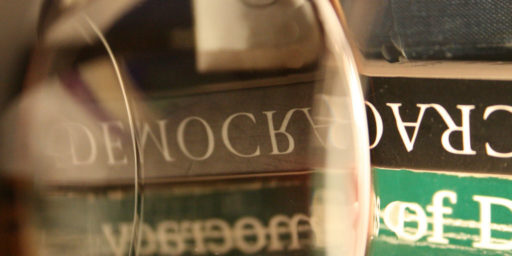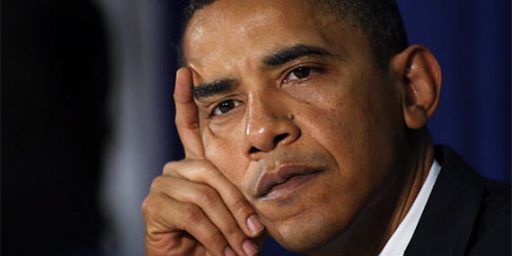Parentalism
Via Radley Balko,
We want the government to guarantee our health, deflect hurricanes, educate our children and license us to drive; we want to be told what to eat, what to smoke and whom to marry. We are justly proud of the fact that no enduring society has ever incarcerated more of its people. Noting that the policeman has a pistol, a club, a stun gun, a can of pepper spray and a database that includes us, we feel happy and secure.
Our submission is absolute: We want to be operated like puppets and provided for like pets.
The terrorists hate our freedom. But we should be comfortable with that. We hate our freedom, too.–Crispin Sartwell
I think Mr. Sartwell has hit the nail squarely on the head. Even the Republicans (at least those in office) appear to think this way (e.g. President Bush and all those Republicans that voted for No Child Left Behind, the Medicare Prescription Drug Plan, the energy bill, the highway bill, etc.)
Radley Balko also points to Julian Sanchez who writes,
[Economists and political theorists] have assumed that, other things being equal, persons want to be at liberty to make their own choices, to be free from coercion by others, including indirect coercion through means of persuasion. They have failed to emphasize sufficiently, and to examine the implications of, the fact that liberty carries with it responsibility. And it seems evident that many persons do not want to shoulder the final responsibility for their own actions..[They] want to be told what to do and when to do it; they seek order rather than uncertainty, and order comes at an opportunity cost they seem willing to bear.
[snip]
Classical liberals have become good at explaining how the market order they favor promotes freedom and happiness. They have been less adept at explaining why–at least past a certain point–people ought to want that freedom, which when genuine is always at least a little frightening. In the face of the parentalist impulse, we may need to develop the case that our bad choices, the choices that make us unhappy, are as vital and precious as the ones that bring us joy.
I’ve felt that the notion of personal responsibility and freedom are the harder sell than the message of current Republicans and Democrats (“We’ll take care of you”). The Republicans and Democrats both see government as: if we just get it right everything will be great. And the public seems to largely agree with this. The idea of scuttling Social Security and taking charge of one’s own finances and being responsible enough to save for the future is all too frequently met with the response: “Well, some people wont save for the future, what about them?” My response is “Well, what about them? If that is the kind of decision they want to make, who am I to tell them otherwise.” Many people are aghast at such a response. However, it isn’t meanness and hard heartedness that motivates my answer. Maybe some of the people aren’t saving for their retirement because current needs are seen as outweighing future needs. I see forcing such people to save as forcing them into a situation they don’t want. Which is policy is more mean? Not so clear cut now, IMO.
Granted some people are going to do dumb things. But should we as a society try to stop them? If a man wants to be foolish enough to take his life savings to Las Vegas and risk it all on a roll of the dice how is that any more foolish than another person taking his life savings and buying a state funded lottery ticket? While the State might object to the former, it almost surely wont object to the latter.
If you are advocating things like life time employement, government provided health care, government provided retirement, government provided housing, and the such guess what; you no longer want freedom. You want to be a pet. And disturbingly the Republicans seem all too eager to head right down this road behind the Democrats.






Not to mention that a nation of frugal consumers should recognize that they only get pennies on the dollar for services purchased by the government, when they can get the same or better ‘on sale’ in a competitive market.
“Freedom is not worth having if it does not include the freedom to make mistakes.”
Mahatma Gandhi
If a man wants to be foolish enough to take his life savings to Las Vegas and risk it all on a roll of the dice…
That person can, but there will be some kind of safety net to provide for the idiot if the wheel hits 00. IOW, what we currently seem to have is a system that mitigates the harsh consequences of stupid action. I don’t see how that turns us into pets so long as we still retain the freedom to make those poor choices in the first place.
jpe,
The point is that we are seeing a movement towards less choice, not more. Eventually you wont be able to go to Vegas either. Just as there are people who don’t want others eating fatty foods, drinking alcohol, taking illegal narcotics, etc.
Further, mitigating the impact of stupid choices means that people will be more likely to go with the stupid choices.
steve; WOW, that has to be the most profound thing you ever wrote; and with great quotes, thanks, and don’t let my agreement give you second thoughts[lol]
I think you’ve hit upon something that becomes evident when we look at the situation in France, or even Detroit. Many people want to have security more than they want ultimate liberty. Why? Because security (in jobs, for instance) means there are fewer “huge” dangers around the corner, and they can enjoy what might be called “small scale” liberty – the liberty to buy a boat and sit in their back yard drinking beer on their days off. Sure, there are trade-offs. Their job mobility is less, and their overall lives may seem bleak to an enlightened intellectual. But they accept that tradeoff. These are not always the people who would go to Vegas to gamble their entire life savings, but people who place their bets on a stable, well-paying job and a small house in the suburbs. What used to be the “American dream.”
I know these people, because I grew up with parents who are among their number.
I’m not sure everyone is looking to government to give this to them, but it does seem that government is the last place that offers this type of cradle-to-grave security.
While we are at it we can take the government out of supplying water, or removing sewage, or certifying food producers. If some people don�t deal with their sewage, and their yards stink, and their children are diseased, so what?
That last post did not come out right. Sorry, too snide.
The point is that we do need some government, and a modern society needs more than our old agrarian, and early industrial society needed. Productivity in both the industrial and agricultural components of our economy has greatly advanced, and has much more growth to come.
Ray Kurzweil is right about the accelerating pace of technology, as he states in his book ‘The Singularity is Near’.
Modern States, whether they know it or not, are going to need wealth distribution systems of some sort as the future unfolds. The Social Security system that we have is almost right. It is a fair and sensible way to begin a system of wealth distribution; start with the old folks who worked and built the advances, etc. They trickle it down to their kids, and are not on the back of their kids as dependents.
As the decades go by experience will offer up more opportunities to share the wealth that our history has sent down to us.
Pie in the sky? Some sure; the polititians will try to screw it up. The great war will sidetrack us for awhile, but then the sun will shine again.
RJN,
Screw Kurzweil that notion is older than that dude, try Benito Mussolini.
“We were the first to assert that the more complicated the forms assumed by civilization, the more restricted the freedom of the individual must become.”
Benito Mussolini– quoted in The Road to Serfdom, chapter 4.